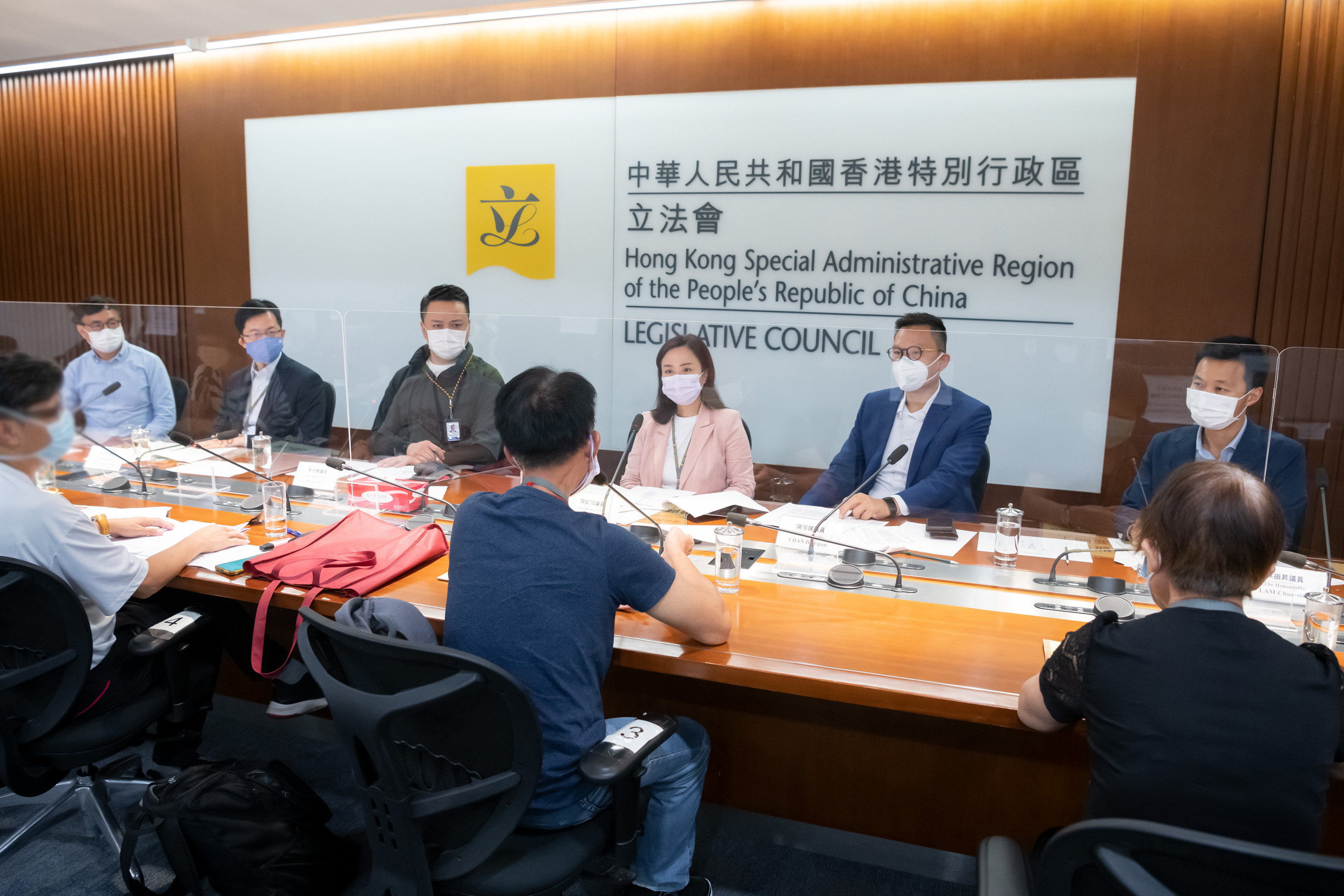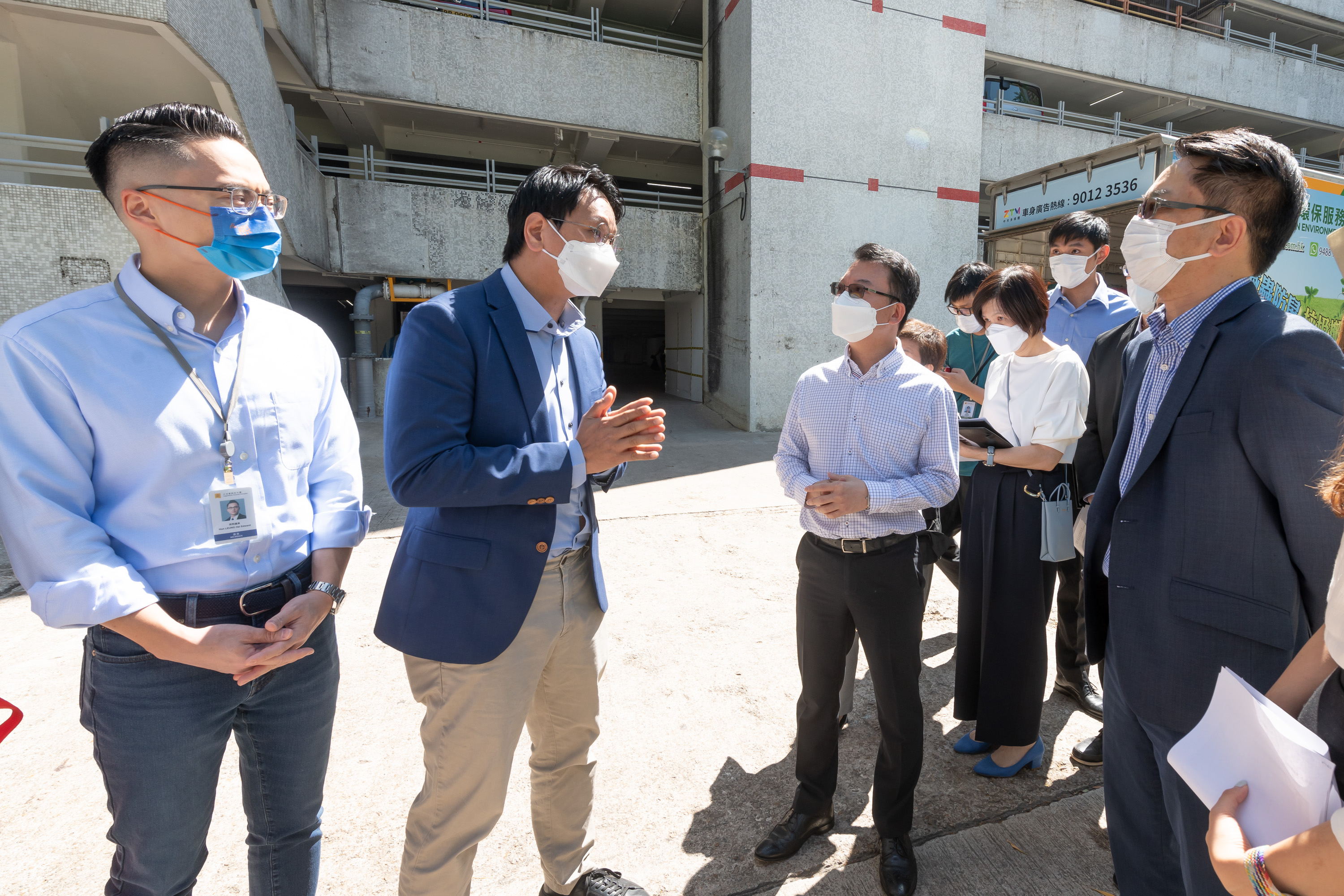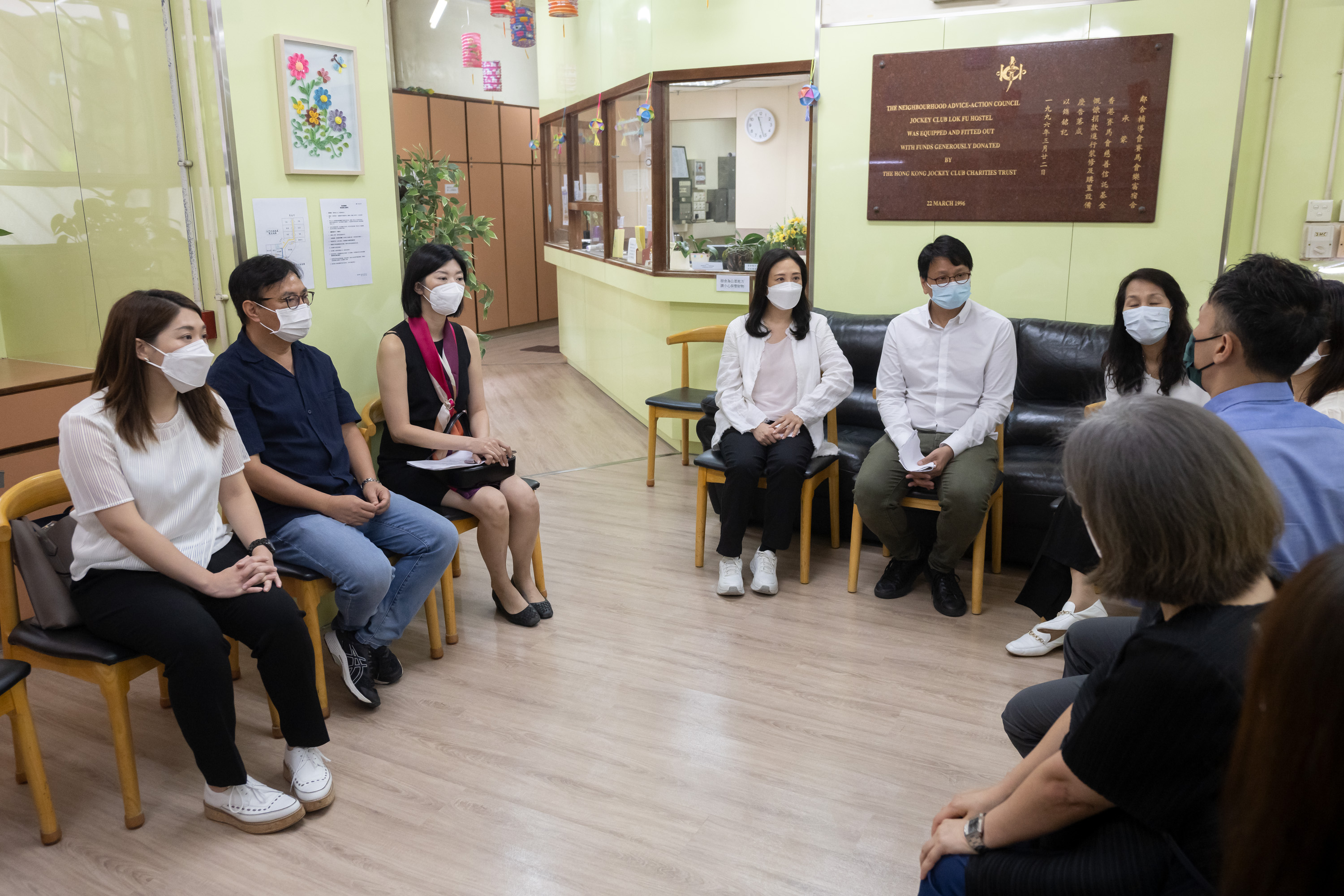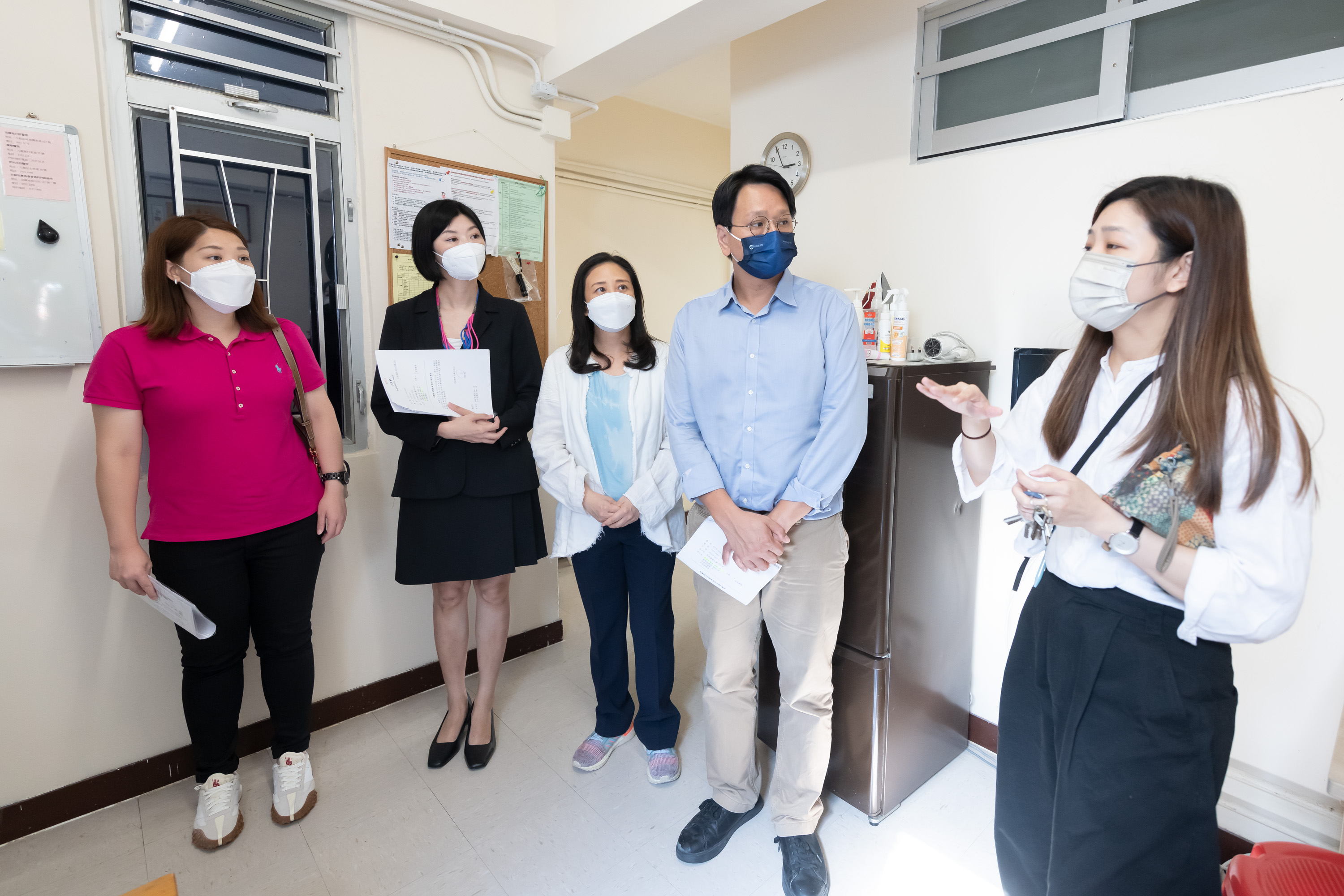The Legislative Council
Annual Report 2022
Introduction
The Legislative Council operates a Redress System to receive and handle complaints from individual members of the public and deputations who are aggrieved by government actions or policies. It also deals with public representations on government policies and legislation, as well as other matters of public concern.
Members take turns, in groups of nine, to be on duty each week to oversee the Redress System, and to receive and handle representations of and complaints made by deputations. During their duty week, Members also take turns to undertake “ward duty” during which they meet with individual members of the public and provide guidance to staff on the processing of cases.
Photos of site visits
Statistics
No. of new cases received
43 2121
No. of cases processed and concluded during the session
43 1521
No. of site visits conducted
3
No. of case conferences held with representatives of the Government and/or public organization
5
No. of telephone enquiries received
838
No. of views circulated to Duty Roster Members
15
-
Among the 43 212 new cases received, 50 were group representations and 43 162 were submitted by individual members of the public. There were 42 152 cases of form letters which were related to requests for assistance on the measures for tackling COVID-19. These cases were processed and concluded with information given where contact means had been provided.
Common types of cases handled
Some of the more common types of cases dealt with under the Redress System are highlighted below.
Policy bureau/government department
Health Bureau (former Food and Health Bureau)
Total no. of cases
42 241
Common types of cases handled
- Complaints about the launching of “Vaccine Pass” and “vaccine bubble”, implementation of the place-specific flight suspension mechanism, insufficient provision of specimen collection packs, inadequate publicity on adjustments to the vaccination requirements of “Vaccine Pass”, the community isolation facilities, the COVID-19 Electronic Testing Record System, and the restriction-testing declaration;
- Requests for assistance on the measures for tackling COVID-19, the requirement for using the “LeaveHomeSafe” mobile application for entry into catering premises, mandated closure of barber shops, information provided on the “Interactive Map Dashboard on the Latest Situation of COVID-19”, safety of COVID-19 vaccines, and the telephone service of a General Out-patient Clinic; and
- Proposals for tightening quarantine arrangements, constructing a hospital for quarantine and treatment of COVID-19, complete closure of immigration control points to avoid imported cases of COVID-19, improving the arrangements of mobile specimen collection stations and for compulsory testing, enacting legislation on euthanasia, enhancing public healthcare services, admitting non-locally trained doctors to practise in Hong Kong, and increasing tobacco duty.
Follow-up
- The complaints, requests and proposals were taken up with the Administration in the form of written referral.
Policy bureau/government department
Transport Department
Total no. of cases
227
Common types of cases handled
- Complaints about bus and minibus services, newly erected traffic signs, designated disabled car parking spaces, and the driving attitude of a minibus driver;
- Requests for assistance on improving the queueing arrangements of bus stops, provision of additional bus stops, enhancing bus services and bus stop facilities, student transport service, and formulating measures to enhance road safety and to combat illegal parking; and
- Proposals for providing new bus routes and interchange concessions, enhancing the dissemination of information by franchised bus companies via mobile applications, the Internet and printed passenger notices, flexible deployment of bus resources to address passengers’ needs, installing real-time bus arrival information display panels, relocating bus stops to better facilitate passengers, renaming bus stops and a bus terminus, and shelving the proposed increase in the daily quota for the Driving on Lantau Island Scheme.
Follow-up
- The complaints, requests and proposals were taken up with the Administration in the form of written referral.
Policy bureau/government department
Housing Department
Total no. of cases
45
Common types of cases handled
- Complaints about the staff of the Housing Department (“HD”), services of the property services agents appointed by HD, the fire safety improvement works for a public rental housing (“PRH”) estate, the random checking conducted by the Public Housing Resources Management Sub-section of HD, and the high vacancy rate of Housing for Senior Citizens units; and
- Requests for assistance on early allocation of PRH units, application for transfer, and prevention of bid-rigging in the repair and maintenance works for an estate under the Tenants Purchase Scheme.
Follow-up
- The complaints and requests were taken up with the Administration in the form of written referral or case conference.
Policy bureau/government department
Development Bureau
Total no. of cases
28
Common types of cases handled
- Requests for assistance on the resumption of brownfield sites in Tuen Mun, and the compensatory arrangements for residents affected by the Yuen Long South Development Project; and
- Proposals for cancelling the subsidies offered under the Integrated Building Rehabilitation Assistance Scheme for prudent use of public money, increasing land supply for residential purpose, and relaxing the plot ratios for rural residential land and redevelopment of old residential buildings.
Follow-up
- The requests and proposals were taken up with the Administration in the form of written referral.
Policy bureau/government department
Lands Department
Total no. of cases
25
Common types of cases handled
- Complaints about the performance of a contractor appointed by the Lands Department, the clearance of squatters in Yuen Long, and unauthorized occupation of government land; and
- Requests for assistance on tree pruning and grass cutting for various government land sites, the cancellation of the squatter survey numbers, and the taking of lease enforcement actions against breaches of lease conditions.
Follow-up
- The complaints and requests were taken up with the Administration in the form of written referral.
Significant cases handled
Provision of an inclined lift
A deputation sought Members’ assistance on the provision of an inclined lift to facilitate access of the residents of a public housing estate, especially the elderly who represented 30% of the tenant population, to and from the market, transportation and leisure facilities downhill. In response to Members’ urge for acceding to the deputation’s request so as to be in line with the Government’s advocacy of promoting the quality of life of the elderly population, and subsequent to a site visit conducted with Members, the Administration undertook to favourably consider the deputation’s request and to conduct a feasibility study for the proposed construction, which would likely be completed by mid-2023.
Regulation of the use of electric scooters
A complainant sought a Member’s assistance on the safety threats posed by the use of electric scooters on footpaths to pedestrians, particularly the visually-impaired, and hence the call for regulation. In response to the Member’s referral and the urge for protection of pedestrian safety, the Administration undertook to examine issues related to proper regulation of the use of electric mobility devices, including electric scooters, and to step up publicity to enhance public awareness of the prohibited use of electric mobility devices on footpaths under the Road Traffic Ordinance (Cap. 374).
Excessive packaging
A complainant sought a Member’s assistance on the environmental problems caused by excessive packaging of products purchased online. Sharing the complainant’s concern over the negative environmental impact caused by excessive packaging, the Member called on the Administration to tackle the problem. Apart from liaising with the concerned online shopping platform operators to encourage them to adopt simple packaging and to recycle packaging materials, the Environmental Protection Department undertook to join forces with trade practitioners and other government departments to promote simple packaging, and encourage green business and consumption through publicity and education. It would, in addition to the supermarkets and grocery stores sector which had already been issued with the Practical Guide on Packaging Reduction And Management, issue practical guides to other sectors for reference.
Introduction
Introduction
Statistics
Common types of cases handled
Significant cases handled








